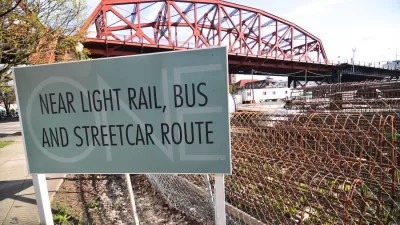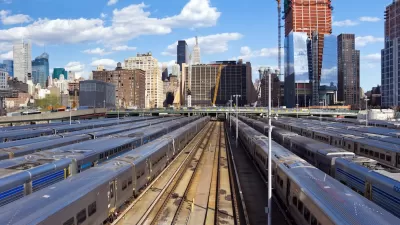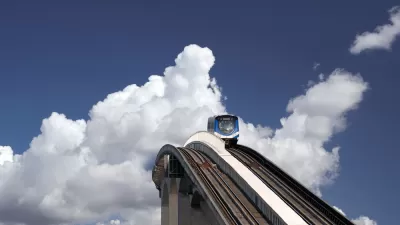From an environmental perspective, transit oriented development is hard to argue. From a socio-economic perspective, transit oriented development must make room for all income levels, according to this opinion piece posted on the NRDC website.

Jeff Turrentine writes about the connections between gentrification and public transit investments.
Things have changed. Transit-oriented development, once little more than a jargony buzz phrase uttered by urban planners and public transportation advocates, is transforming cities and suburbs all across the country as the market for housing near transit hubs continues to explode.
Unfortunately, this type of development is also changing the affordability of long-standing communities that working-class residents have called home for generations. At issue is something called transit-induced gentrification, a socioeconomic by-product of transit-oriented development that would have been largely unthinkable 25 years ago, when the idea of living above a busy train station and not owning a car held less appeal among the upwardly mobile than it does today.
Turrentine cites examples from California, in San Diego, Los Angeles, the San Francisco Bay Area, and Sacramento as evidence of the reality of transit-induced gentrification, but also finds similar concerns reported in Chicago, Atlanta, and Portland.
As a response, Turrentine argues that communitarian interests protesting transit oriented development have understandable concerns, but their actions are short-sighted.
Done right, this type of development can revitalize cities while demonstrably curbing carbon pollution by lowering automobile use. The key is in balancing these social goods with the good that comes from keeping existing communities healthy and intact—even as we set about building new ones.
So what does transit oriented development "done right" look like? Click through to the source article to read Turrentine's take.
FULL STORY: When Public Transportation Leads to Gentrification

Trump Administration Could Effectively End Housing Voucher Program
Federal officials are eyeing major cuts to the Section 8 program that helps millions of low-income households pay rent.

Planetizen Federal Action Tracker
A weekly monitor of how Trump’s orders and actions are impacting planners and planning in America.

Ken Jennings Launches Transit Web Series
The Jeopardy champ wants you to ride public transit.

Crime Continues to Drop on Philly, San Francisco Transit Systems
SEPTA and BART both saw significant declines in violent crime in the first quarter of 2025.

How South LA Green Spaces Power Community Health and Hope
Green spaces like South L.A. Wetlands Park are helping South Los Angeles residents promote healthy lifestyles, build community, and advocate for improvements that reflect local needs in historically underserved neighborhoods.

Sacramento Plans ‘Quick-Build’ Road Safety Projects
The city wants to accelerate small-scale safety improvements that use low-cost equipment to make an impact at dangerous intersections.
Urban Design for Planners 1: Software Tools
This six-course series explores essential urban design concepts using open source software and equips planners with the tools they need to participate fully in the urban design process.
Planning for Universal Design
Learn the tools for implementing Universal Design in planning regulations.
Heyer Gruel & Associates PA
Ada County Highway District
Institute for Housing and Urban Development Studies (IHS)
City of Grandview
Harvard GSD Executive Education
Toledo-Lucas County Plan Commissions
Salt Lake City
NYU Wagner Graduate School of Public Service





























